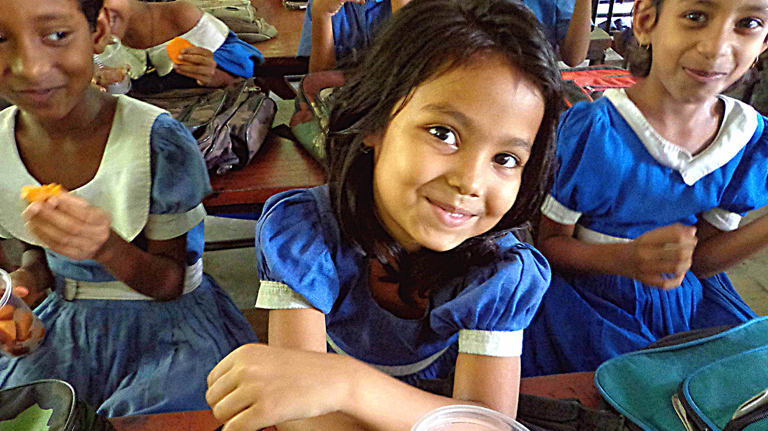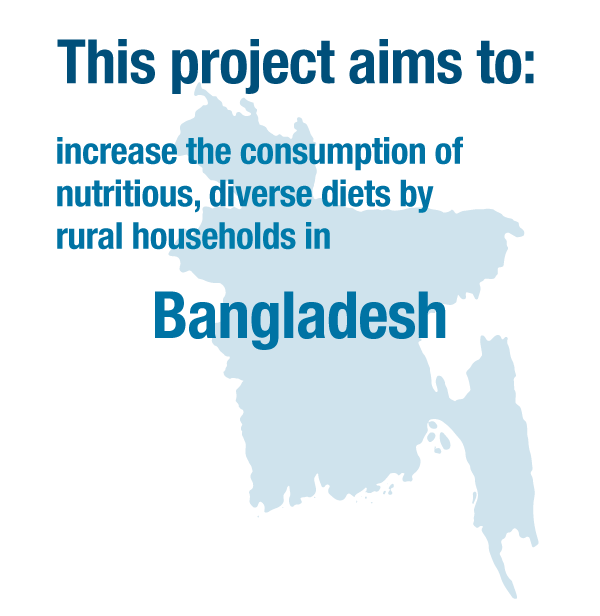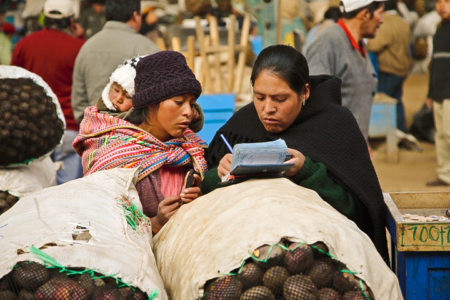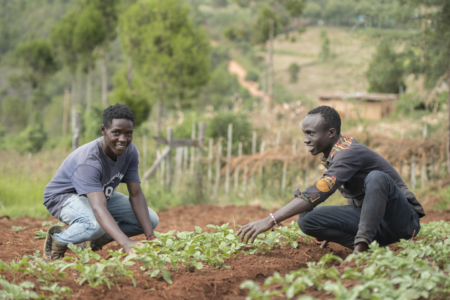
Despite the introduction of improved crops and production practices in Bangladesh, persistent malnutrition continues to adversely affect the health and wellbeing of its people, particularly women and children. Poor nutrition is also impeding the country’s development and economic growth. This project takes a consortium approach to strengthening the overall food system, aiming to empower a range of actors and increase their capacity to address the underlying causes of malnutrition.
Background
Adoption of Green Revolution technologies in the 1980s led to a significant increase in rice production and, since then, Bangladesh has been largely self-sufficient in this commodity. However, with rice dominating the agriculture sector, there is limited diversification in people’s diets and low demand for more varied products. Overdependence on rice for calorific intake is one cause of the country’s persistent malnutrition, which is expressed in an unacceptably high rate of stunting in children (36% in 2014). Direct support programs have helped improve the situation, but activities to increase the ability of public, private and community actors are required to lay the foundations for improved development outcomes in the long term.
The US development organization Abt Associates has therefore brought together a consortium to address the need for improved nutrition, particularly in rural areas. This includes the International Potato Center (CIP), International Development Enterprise (iDE) and three local partners (Dhaka Ahsania Mission, Friends in Village Development and Jagorani Chakra Foundation) with experience in agriculture, health and education, as well as in water, sanitation and hygiene (WASH).
The project is part of the United States Agency for International Development (USAID) Feed the Future Initiative.
Activities will be focused in Dhaka, Barisal and Khulna, the geographic areas designated as USAID ‘zones of influence’. CIP’s role is to provide technical expertise on agriculture market systems, and to facilitate market accessibility (quality, volume and price) to improved seeds and planting materials for nutrient-rich crops.
Objectives
To contribute to improvements in nutrition outcomes for children under five, pregnant and lactating women, and adolescent girls in the zones of influence by:
- influencing rural household consumption of nutritious, diverse and safe diets;
- increasing the social and economic empowerment of girls and women; and
- improving the adoption of WASH good practices.
Approach
The partners will take a system strengthening approach to improving Bangladesh’s food system. This includes influencing food production and consumption decisions; the social, cultural and economic factors affecting empowerment of women and young people and WASH practices that affect health and the absorption of nutrients. The aim is to empower public, private and community actors to address the underlying causes of malnutrition. By introducing sustainable improvements to the functioning and outcomes of the food system, the interventions will ultimately alter household behavior and measurably improve nutrition outcomes.
CIP’s principal goal is to increase the consumption of nutritious, diverse diets by rural households. CIP works through growth centers and agri-input retailers providing technical assistance on strengthening food and agricultural market systems. This includes developing its collaboration with small, medium and large seed companies, and fertilizer and pesticide dealers. Working together, these actors will promote nutrition messages through the sale of seeds of nutrient-dense crops that are appropriate for small-scale producers in the zones of influence. Additional activities will focus on expanding seed distribution through women-owned marketing channels and using ‘nutrition scholars’ – young female and male health graduates – to engage youth groups, schools, etc. in eating a healthier diet.
The project will address gender inequalities throughout the design and implementation of activities, seeking to influence gender roles, relations and social norms. The objective is to promote shared decision-making and control of resources by supporting the empowerment of women. Environmental compliance and sustainability will also be built in to the program’s design. The project goals align closely with key US and Bangladesh government policies and development strategies.
Expected outcomes
Partners will work through nutrition-sensitive interventions to complement and reinforce ongoing activities. This approach is expected to catalyze results by strengthening the food system in the zones of influence. Taking a multi-sectoral approach and targeting activities in areas of greatest potential will reach actors and address gaps throughout the different sectors that influence the food system in Bangladesh. One of the main achievements will be to identify key actors who will become champions or role models and thus have an extensive influence on key societal groups. At the end of the project, actors will be better able to analyze, design, implement and resource interventions to improve nutrition outcomes in the zones of influence.
| Outcomes |
| Increased consumption of nutritious, diverse and healthy diets by rural households |
| Increased social and economic empowerment of women and adolescents |
| Increased adoption of improved water, sanitation, and hygiene behaviors |
Contact
Simon Heck
CIP, Kenya
s.heck@cgiar.org
Thanks to our donors





